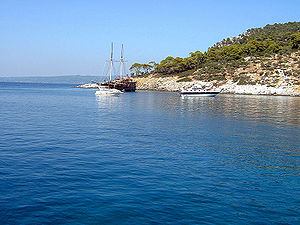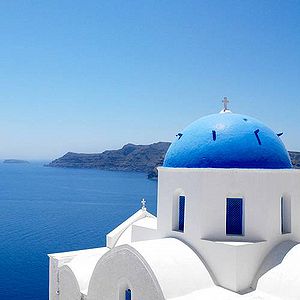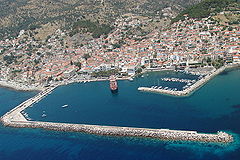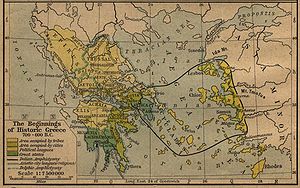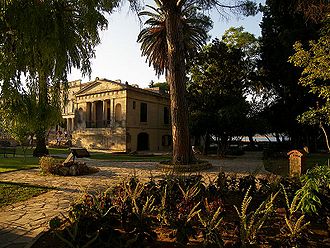Greece
 From Conservapedia - Reading time: 14 min
From Conservapedia - Reading time: 14 min
| Ελληνική Δημοκρατία Ellīnikī́ Dīmokratía | |
|---|---|
| Flag | Coat of Arms |
| Capital | Athens |
| Government | Parliamentary Republic |
| Language | Greek (official) |
| President | Prokopis Pavlopoulos |
| Prime minister | Alexis Tsipras |
| Area | 50,944 sq mi |
| Population | 10,500,000 (2020) |
| GDP | $210,000,000,000 (2020) |
| GDP per capita | $20,000 (2020) |
| Currency | euro |
| Internet top-level domain | .gr |
Greece (Greek: Ελλάδα, Elláda; officially: Ελληνική Δημοκρατία, "Hellenic Democracy") is a Balkan country located in the Southeastern part of Europe. It is also used as a collective term for the ancient civilizations of that geographic area. It is now a developed country[1] and member of the EU (European Union) and NATO.
Greece was hit hard by the worldwide Recession of 2008, and government finances are chaotic. The government deficit of 12.7% of GDP is the highest in the EU.
In July 2015, voters in Greece overwhelmingly rejected demands by the EU for fiscal austerity, which cast doubt on whether Greece would continue to use the euro as its currency.
Contents
Geography[edit]
The mainland of Greece consists of two large parts connected by a small land bridge at the Gulf of Corinth (this has since been divided by the man-made Corinthian Canal), as well as nearly all the islands within the Aegean Sea.
- Area: 131,957 km2. (51,146 sq. mi.; roughly the size of Alabama).
- Major cities: Capital—Athens. Greater Athens (pop. 3,566,060), municipality of Athens (772,072), Greater Thessaloniki (pop. 1,057,825), *Thessaloniki (824,633), Piraeus (182,671), Greater Piraeus (880,529), Patras (170,452), Iraklion (132,117), Larissa (113,090).
- Terrain: Mountainous interior with coastal plains; 1,400-plus islands.
- Climate: Mediterranean; mild, wet winter and hot, dry summer.
People[edit]
Greece was inhabited as early as the Paleolithic period and by 3000 B.C. had become home, in the Cycladic Islands, to a culture whose art remains among the most evocative in world history. In the second millennium B.C, the island of Crete nurtured the maritime empire of the Minoans, whose trade reached from Egypt to Sicily. The Minoans were supplanted by the Mycenaeans of the Greek mainland, who spoke a dialect of ancient Greek. The roots of Greek language and culture date back at least 3,500 years and its history is conventionally split into 3 major periods: Classical (1,500 BC - 4th century AD), Byzantine (4th century AD - 15th century) and Modern (15th century through today). [2]
- Population (2005 est.): 11,104,000 million. (Immigrants make up approximately 10% of the population.)
- Growth rate (2007 estimated): 0.163%.
- Languages: Greek 99% (official); Turkish, others. Albanian is spoken by approximately 700,000 Albanian immigrants. English is the predominant second language.
- Religions: Greek Orthodox (approximately 98% of citizens), with Muslim (1.3%), Jewish, Catholic, Protestant, and other religious communities.
- Education: Years compulsory—9. Literacy—97.5%. All levels are free.
- Health: Infant mortality rate—5.43/1,000. Life expectancy—male 76.72 years, female 81.91 years.
- Work force: 4.72 million.
Religion[edit]
Eastern Orthodox Christianity is the dominant religion in Greece and receives state support. During the centuries of Ottoman domination, the Greek Orthodox Church helped preserve the Greek language and cultural identity and was an important rallying point in the struggle for independence. There is a centuries-old Muslim religious minority concentrated in Thrace and an estimated 300,000 Muslim immigrants living elsewhere in the country. Smaller religious communities in Greece include Old Calendar Orthodox, Catholics, Protestants, Jews, Jehovah's Witnesses, Mormons etc.[3]
Education[edit]
Greek education is free and compulsory for children between the ages of 6 and 15. Overall responsibility for education rests with the Ministry of National Education and Religious Affairs. Private colleges and universities (mostly foreign) do have campuses in Greece, although their degrees are not recognized by the Greek state. Entrance to public universities is determined by state-administered exams.
Government and Political Conditions[edit]
The October 2009 elections were convincingly won by the social-democratic Panhellenic Socialist Movement (PASOK) which had been in opposition. The new prime minister is George Papandreou, a former foreign minister whose father and grandfather also served as prime ministers.
Greece is a parliamentary republic whose constitution was last amended in April 2001. There are three branches of government. The executive includes the president, who is head of state, and the prime minister, who is head of government. There is a 300-seat unicameral "Vouli" (legislature). The judicial branch includes a Supreme Court. Administrative subdivisions include 13 peripheries (regional districts) and 51 nomi (prefectures). Suffrage is universal at 18.
Foreign Relations[edit]
Greece's foreign policy is aligned with that of its EU partners. Greece gives particular emphasis to its close relations with Cyprus but also has growing political and economic ties with the Balkan countries and the Middle East.
Greece maintains full diplomatic, political, and economic relations with its Southeast European neighbors and regards itself as a leader of the region's Euro-Atlantic integration process. It provides peacekeeping contingents for Bosnia, Kosovo and Afghanistan. Greece has good relations with Russia and has embassies in a number of the central Asian republics, which it sees as potentially important trading partners.
Prominent issues in Greek foreign policy include Greek-Turkish differences in the Aegean, the name dispute with Macedonia and the reunification of Cyprus.
Former Yugoslav Republic of Macedonia (FYROM)[edit]
The Greek dispute with its northern neighbor over its constitutional name, Republic of Macedonia, has been an important issue in Greek politics since 1992 and has inhibited the development of the bilateral relations to their fullest. Greece is weary of irredentist claims to the Greek province of Macedonia by certain FYROM circles. It is adamantly opposed to the use by FYROM of ethnic symbols that have historically been associated with Greek history in the geographic area of Macedonia and, in particular to the use of "Macedonia" by the government in Skopje.[4] Mediation efforts by the UN and the United States brokered an interim agreement whereby Greece recognized the country as the Former Yugoslav Republic of Macedonia (FYROM) in September 1995. Since then, relations between the country developed rapidly, especially, in the economic sector where Greek entrepreneurs and direct aid have been crucial to FYROM's transition from a communist to a capitalist economy. Talks on the only outstanding issue remaining, that of the name, continue under UN auspices.
Albania[edit]
Greece restored diplomatic relations with Albania in 1971, but the Greek Government did not formally lift the state of war, declared during World War II, until 1987. After the fall of the Albanian communist regime in 1991, relations between Athens and Tirana became increasingly strained because of allegations of mistreatment of the Greek ethnic minority by Albanian authorities in southern Albania. A wave of Albanian illegal economic migrants to Greece exacerbated tensions. In the past several years, however, cooperation between Greece and Albania has improved, with efforts focused on regional issues, such as narcotics trafficking and illegal immigration. Greece remains host to 600,000-800,000 Albanian immigrants, many of them illegal. Crime in Greece involving Albanians often attracts headlines.
Greek-Turkish Relations[edit]
Greece and Turkey have unresolved issues regarding the Aegean maritime boundary, the treatment of the Orthodox Church and Greek minority in Istanbul, and the Muslim minority in western Thrace. The largest source of tension in their relationship since 1974 has been the Cyprus conflict. Various UN-led efforts over the years to resolve the issue on a bizonal, bicommunal basis have failed: the latest attempt, the Annan Plan, was overwhelmingly rejected by Greek Cypriots in March 2004. Turkish Cypriots voted in favor of the plan and both Greece and Turkey expressed their approval. The Republic of Cyprus entered the EU on May 1, 2004 as a divided island. The UN is currently assessing whether the political will exists among the interested parties to restart negotiations.
At times over the past three decades, tensions between Greece and Turkey have almost reached the point of armed conflict. In 1996, President Clinton intervened to help avert a possible armed exchange after Greek and Turkish journalists generated a dispute over ownership of a tiny, uninhabited but strategically located islet called Imia (Kardak in Turkish). A significant breakthrough in relations took place when major earthquakes hit Turkey and Greece in 1999. Both countries and peoples responded generously to the other's need, helping turn around official perceptions that rapprochement was too risky politically. Since that time, Greek and Turkish Foreign Ministers have increased the quantity and quality of bilateral exchanges, both official and unofficial. However, the seriousness of the tensions is manifested by the fact that Turkey still maintains a list of issues that constitute casus belli in its relations with Greece.
Greece has endorsed and supported Turkey's bid for candidacy to the European Union since the Helsinki EU Summit in 1999. Despite continuing disagreements with Ankara over Cyprus and the Aegean, Greek opinion leaders across the political spectrum are convinced that Greece's long-term interests are best served by Turkey's successfully fulfilling the requirements for membership and joining the European Union. The EU opened accession talks with Turkey on October 3, 2005.[5]
The Middle East[edit]
Greece claims a special interest in the Middle East because of its geographic position and its economic and historic ties to the area. Greece cooperated with allied forces during the 1990-91 Persian Gulf War. Since 1994, Greece has signed defense cooperation agreements with Israel and Egypt. In recent years, Greek leaders have hosted several meetings of Israeli and Palestinian politicians to contribute to the peace process. Greece has been traditionally sympathetic to Palestinian problems. However, beginning in the late 1990s, efforts to strike a more balanced relationship with Israel received a boost. Greek-Israeli relations have in the past been complicated by Israel's strategic cooperation with Turkey. Israeli President Moshe Katsav visited Greece in 2006, the first-ever official visit by an Israeli head of state.
Economy[edit]
Greece adopted the euro as its new common currency in January 2002. The adoption of the euro provided Greece (formerly a high inflation risk country under the drachma) with access to competitive loan rates and also to low rates of the Eurobond market. This led to a dramatic increase in consumer spending which gave a significant boost to economic growth. This credit also led to a more relaxed fiscal policy starting in 2002, which, combined with expenditures associated with the preparation of the Athens 2004 Olympics, resulted in higher than intended deficits and debt in 2003 and 2004. The government deficit in 2004 is now estimated by the Greek government to have reached 6.6% of GDP. As a result of lower post-Olympic spending, the government deficit in 2005 is estimated to have been lowered to 4.3% of GDP, with a debt to GDP ratio of 107.9%. The administration pledged to reduce the government debt to 2.6% of GDP in 2006 and to tighten fiscal finances, under an EC excessive deficit surveillance program.
- GDP: $314.4 billion.
- Per capita GDP: $28,280.
- Growth rate: 4.0%.
- Inflation rate: 3.0%.
- Unemployment rate (annual average): 8.3%.
- Natural resources: Bauxite, lignite, magnesite, oil, marble.
- Agriculture (5.4% of GDP): Products—sugar beets, wheat, maize, tomatoes, olives, olive oil, grapes, raisins, wine, oranges, peaches, tobacco, cotton, livestock, dairy products.
- Manufacturing (21.3% of GDP): Types—processed foods, shoes, textiles, metals, chemicals, electrical equipment, cement, glass, transport equipment, petroleum products, construction, electrical power.
- Services (73.3% of GDP): Transportation, tourism, communications, trade, banking, public administration, defense.
- Trade: Exports--$23.5 billion: manufactured goods, food and beverages, petroleum products, cement, chemicals. Major markets—Germany, Italy, France, U.S., U.K. Imports--$75.8 billion: basic manufactures, food and animals, crude oil, chemicals, machinery, transport equipment. Major suppliers—Germany, Italy, France, Japan, Netherlands, U.S.
The Greek economy is estimated to have grown by 3.6% in 2005 and similar growth rates are projected through 2007. These growth rates resulted in a drop in unemployment (to 7.3% in the second quarter of 2007 from 10.4% in the same period in 2004). Foreign direct investment inflow has also dropped, and efforts to revive it have been only partially successful. At the same time, Greek investment in Southeast Europe has increased, leading to a net FDI outflow in some years.
Services make up the largest and fastest-growing sector of the Greek economy. About 14 million tourists were estimated to have visited Greece in 2005, with net revenues of about 10 billion euros. Remittances from transport (mainly shipping) are growing, and actually exceeded tourism receipts in 2004 and 2005. Receipts from tourism and transport have covered a significant portion of Greece's large trade deficit. Industrial activity has shown a mixed performance, with certain sectors such as the food industry and high-tech/telecommunications showing healthy increases, while textiles have declined. Agriculture employs about 12% of the work force and is still characterized by small farms and low capital investment, despite significant support from the EU in structural funds and subsidies. Traditionally a seafaring nation, the Greek-owned merchant fleet totaled 3,338 ships in March 2005, 8.7% of the world merchant fleet and 16.5% of world tonnage.
European Union (EU) Membership[edit]
Greece has realigned its economy as part of its transition to full EU membership that began in 1981. Greece last held the rotating EU presidency in the first half of 2003. Greek businesses continue to adjust to competition from EU firms, and the government has liberalized its economic and commercial regulations and practices.
Greece has been a major net beneficiary of the EU budget; in 2004, EU transfers accounted for 3.6% of GDP and are estimated to have been approximately 3.2% of GDP in 2005. From 1994–99, about $20 billion in EU structural funds and Greek national financing were spent on projects to modernize Greece's transportation network in time for the Olympics in 2004. The centerpiece was the construction of the new international airport near Athens, which opened in March 2001 soon after the launch of the new Athens subway system.
EU transfers to Greece continued with approximately $24 billion in structural funds for the period 2000–2006. Bureaucratic obstacles have led to significant delays in Greece's absorbing these funds which means that Greece may forfeit a portion of that. The same level of EU funding, $24 billion, has been allocated for Greece for 2007–2013. EU funds will continue to finance major public works and economic development projects, upgrade competitiveness and human resources, improve living conditions, and address disparities between poorer and more developed regions of the country.
History[edit]
Ancient History[edit]
Ancient Greece had a lot of influence on many of today's cultural achievements, like democracy and the art of debating. The ancient Greeks were pagans, believing in their own pantheon of numerous gods.
Greece was instrumental in the spread and subsequent growth of Christianity. The first town of (today's) Europe Paul set foot in was Philipi in Northern Greece and the Athens hill on which he preached is one of the most important landmarks of the town. It is generally accepted that the Greek-speaking part of the Roman Empire was the first one to abandon paganism [6] and certainly, Constantine the Great, the first Christian Roman Emperor, moved his capital to Constantinople in the Greek East. Most of the great Church Fathers were either Greek or primarily active in the Greek-speaking areas of the Empire [7] (See: Greek influence on Western Culture)
The Byzantine Empire, as it was late called, was a continuation of the (Eastern) Roman Empire, but it was gradually identified with the Greek national conscience and the Greek-Orthodox Church.[8] The Byzantine State was dissolved after the conquest of Constantinople by the Ottoman Turks in 1453. The Greeks, along with the other Orthodox subjects of the Ottoman Empire, were represented by the Ecumenical Patriarchate of Constantinople and the Greek-Orthodox Patriarch was responsible for the obedience of the Orthodox subjects to the Sultan.
Modern History[edit]
The Greek War of Independence began in 1821 and concluded in 1830 when England, France, and Russia forced the Ottoman Empire to grant Greece its independence under a European monarch, Prince Otto of Bavaria.

At independence, Greece had an area of 47,515 square kilometers (18,346 square mi.), and its northern boundary extended from the Gulf of Volos to the Gulf of Arta. Under the influence of the "Megali Idea," the expansion of the Greek state to include all areas of Greek population, Greece acquired the Ionian islands in 1864; Thessaly and part of Epirus in 1881; Macedonia, Crete, Epirus, and the Aegean islands in 1913; Western Thrace in 1918; and the Dodecanese islands in 1947.
Greece was politically divided as to which side to support during World War I, the king, Constantine I, wished to support the Central Powers and Prime Minister Venizelos wished to support Britain and France. The king dismissed Venizelos who set up a rival government in Thessaloniki and invited Allied troops to enter the country; which they did in 1917. The king went into exile and the split between Venizelos supporters and the Royalist parties began the 'Nation Schism' which was to mark the politics of Greece for the first half of the twentieth century. After the war, Greece supplied the overwhealming majority of the troops that took part in the Allied occupation of Turkey, where many Greeks still lived. Venizelos lost the general election in 1921 and the king returned. In late 1921, under Royalist Officers, those supporting Venizelos having been cashiered, the Greek army marched toward Ankara. It failed to reach it and was eventually defeated by Turkish forces led by Atatürk and forced to withdraw. Following the Greek defeat, in September 1922 Turkish troops sacked and burnt the town of Smyrna (now Izmir) resulting in the deaths of up to 30,000 Greek and Armenian refugess while British, French and American warships in the harbour, pleading neutrality, refused to pick up those attempting to flee; having their bands play loud music to drown out the cries from the shore.[9] Following the collapse of the Greek attempt to expand into Turkish territory, Venizelos, now back in power, reached a negotiated settlement with Atatürk for a compulsory exchange of populations, the result of which being that more than 1.3 million refugees from Turkey poured into Greece, creating enormous challenges for the Greek economy and society.[10]
Greek politics, particularly between the two world wars, involved a struggle for power between monarchists and Venizelists. Greece was proclaimed a republic in 1924, but George II returned to the throne in 1935 and shortly afterwards cooperated with General Metaxas in a coup which overthrew the democratically elected government and introduced a right wing dictatorship. A plebiscite in 1946 upheld the monarchy, which was finally abolished by referendum on December 8, 1974.
World War II[edit]
Greece sided with the Allies in World War II after Mussolini's demands for surrender were met with the famous "Oxi" (pronounced 'Okhi')(NO!) statement of Greek Prime Minister Ioannis Metaxas. Italy invaded in October 1940, and were repulsed in Albania by Greek troops. When German troops moved in with Operation Marita the Greek cause was hopeless, despite British military help. The Nazi timetable was slowed down during the Battle of Crete by fierce resistance, delaying the German invasion of the Soviet Union for over a month. Despite their efforts, the Nazi war machine was able to annex Greece. In 1943, with the Italian surrender to the Western Allies, Germans turned against their former allies: Italian troops on the continent were interned in POW camps in Germany, while the "Aqui" Division in Kefalonia was brutally exterminated (10,000 killed Italian troops). Following a brutal German occupation in which many Greeks died (including about 80% of Greece's Jewish community) German forces withdrew in October 1944, and the government-in-exile returned to Athens.
After the German withdrawal, the principal Greek resistance movement, which was controlled by the communists, the royalist resistance movement having cooperated with the Germans in many cases rather than allow the communist and leftist resistance to gain effective power, refused to disarm. A banned demonstration by resistance forces in Athens in December 1944 ended in battles with Greek Government and British forces.
Cold War[edit]
After liberation, Greece fell into civil war between communists and royalists. Lasting until 1949, the conflict resulted in a Royalist victory, preserving the Greek state, but at the cost of 40,000 lives. Britain provided some military aid but was too weakened by the war to continue. In 1947, the U.S. used the Truman Doctrine to send large-scale military and economic aid to Greece. In 1948 the Marshall Plan focused on the economic recovery and the rebuilding of Greece and all of Western Europe. The U.S. contributed hundreds of millions of dollars to rebuilding Greece in terms of buildings, agriculture, and industry.
In August 1949, the Greek national army forced the remaining insurgents to surrender or flee to Greece's communist neighbors. The insurgency resulted in 100,000 killed, 700,000 displaced persons inside the country, and catastrophic economic disruption. This civil war left Greek society deeply divided between leftists and rightists.
Greece became a member of NATO in 1952. From 1952 to late 1963, Greece was governed by conservative parties—the Greek Rally of Marshal Alexandros Papagos and its successor, the National Radical Union (ERE) of the late Constantine Karamanlis. In 1963, the Center Union Party of George Papandreou was elected and governed until July 1965. It was followed by a succession of unstable coalition governments.[11]
On April 21, 1967, just before scheduled elections, a group of colonels led by Col. George Papadopoulos seized power in a coup d'état. The junta, supported initially by the Greek monarch and by America, suppressed civil liberties, established special military courts, and dissolved political parties. Several thousand political opponents were imprisoned or exiled to remote Greek islands. In November 1973, following an uprising of students at the Athens Polytechnic University, Gen. Dimitrios Ioannides replaced Papadopoulos and tried to continue the dictatorship.
Gen. Ioannides' attempt in July 1974 to overthrow Archbishop Makarios, the President of Cyprus, brought Greece to the brink of war with Turkey, which invaded Cyprus and occupied part of the island. Senior Greek military officers then withdrew their support from the junta, which toppled. Leading citizens persuaded Karamanlis to return from exile in France to establish a government of national unity until elections could be held. Karamanlis' newly organized party, New Democracy (ND), won elections held in November 1974, and he became Prime Minister.
Following the 1974 referendum, the Parliament approved a new constitution and elected Constantine Tsatsos as president of the republic. In the parliamentary elections of 1977, New Democracy again won a majority of seats. In May 1980, the late Prime Minister Karamanlis was elected to succeed Tsatsos as president. George Rallis was then chosen party leader and succeeded Karamanlis as Prime Minister.
On January 1, 1981, Greece became the 10th member of the European Community (now the European Union). In parliamentary elections held on October 18, 1981, Greece elected its first socialist government, the Panhellenic Socialist Movement (PASOK), led by Andreas Papandreou. In 1985, Supreme Court Justice Christos Sartzetakis was elected president by the Greek parliament. PASOK under Papandreou was re-elected in 1985.
Recent History[edit]
Greece had two rounds of parliamentary elections in 1989; both produced weak coalition governments with limited mandates. In the April 1990 election, ND won 150 seats and subsequently gained 2 others. After Prime Minister Mitsotakis fired Foreign Minister Antonis Samaras in 1992, the rift led to the collapse of the ND government and a victory in the September 1993 elections for Andreas Papandreou's PASOK.
On January 17, 1996, following a protracted illness, Prime Minister Papandreou resigned and was replaced by former Minister of Industry Constantine Simitis. In elections held in September 1996, Constantine Simitis was elected prime minister. In April 2000, Simitis and PASOK won again, gaining 158 seats to ND's 125. Parliamentary elections held March 7, 2004, gave ND a governing majority of 165 seats (against PASOK's 117). Konstantinos Karamanlis, ND leader and the nephew of the former prime minister, became prime minister. Karolos Papoulias was elected President by Parliament in February 2005. The Karamanlis government was re-elected on September 16, 2007. The most recent election, on October 4, 2009, gave a majority to PASOK (160 seats) and the premiership to George Papandreou.
Greece's exemplary success in hosting a safe and secure 2004 Summer Olympics in Athens has enhanced its international prestige. The 2004 Olympics and Paralympics left an impressive and expensive legacy of new roads, spectacular stadiums, and modern public transportation systems, which the PASOK government began in 1997 and the New Democracy government of Karamanlis completed in 2004.
See also[edit]
References[edit]
- ↑ http://travel.state.gov/travel/cis_pa_tw/cis/cis_1127.html
- ↑ Greek: A History of the Language and Its Speakers by Geoffrey C. Horrocks
- ↑ Minorities in Greece by Richard Clogg (2002)
- ↑ Greece: A Modern Sequel by John S. Koliopoulos and Thanos M. Veremis (2002)
- ↑ A Concise History of Greece (Cambridge Concise Histories) by Richard Clogg (2002)
- ↑ Renaissance and Reformation: The Intellectual Genesis, by A. Levi Yale University Press (2004)
- ↑ The Teachings of the Church Fathers, by John Randolph Willis, Ignatius Press (2002)
- ↑ History of the Byzantine State, by G. Ostrogorski, Rutgers University Press (1986)
- ↑ Milton, Giles (2008). Paradise Lost: Smyrna 1922: The Destruction of Islam's City of Tolerance (Paperback ed.). London: Sceptre; Hodder & Stoughton Ltd. ISBN 978-0-340-96234-3.
- ↑ The unification of Greece, 1770-1923, by Douglas Dakin.
- ↑ Short History of Modern Greece, 1821-1956 by Edward Seymour Forster and Douglas Dakin (1977)
| Copyright Details | |
|---|---|
| License: | This work is in the Public Domain in the United States because it is a work of the United States Federal Government under the terms of Title 17, Chapter 1, Section 105 of the U.S. Code |
| Source: | File available from the United States Federal Government. |
 KSF
KSF



